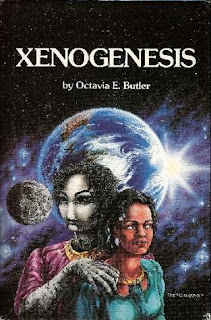Star Trek Discovery vs The Orville
 Hungry Trekkies, not nourished enough by the latest Star Trek movies, have been treated with not one, but two Star Trek series this fall. One is Star Trek: Discovery, the other is The Orville.
Hungry Trekkies, not nourished enough by the latest Star Trek movies, have been treated with not one, but two Star Trek series this fall. One is Star Trek: Discovery, the other is The Orville.You may be incredulous at first, considering you are likely to not have heard of The Orville at all and, if you did, you thought it was a Star Trek parody. But no. Four episodes into the series it's pretty clear that this is a serious sci-fi opera, with some comedy added for spice. What about the new Star Trek series? Well, it's set before The Original Series, it has the visuals closer to the Abramsverse Star Trek (but without the flares, thank you very much), it has redesigned Klingons and a pretty impressive first two episodes.
It is too early to discuss the plot of Discovery yet as the premise hasn't even been revealed in its entirety. As of yet I can only tell you that I hate the main character. A human female raised by the Vulcans behaves in a way that makes one believe her education was acquired only from Vulcans in Pon Farr. CBS went all in and made the show available on their own CBS All Access network and hired actors like Michelle Yeoh to play in the pilot.
Yet Orville, with clearly less money and with TV actors and comedians managed to do better. The episodes are separate, like in a traditional Star Trek series, rather than a long serialized story. The plot of each episode is related to social or moral issues, like in traditional Star Trek series. People are positive and talking about themselves and their feelings, like traditional Star Trek series. There is comedy, but it is not part of the scaffolding of the stories. It's just a funny crew in a Star Trek clone that's as close as it gets. And if we are at the subject of celebrity actors, episode four has freaking Liam Neeson in a few scenes.
Conclusion: it may go either way, but right now The Orville seems to have done what I thought people would do: renounce the CBS/Paramount property and their money grabbing schemes, but keep faith with Gene Roddenberry's vision. Because that is the soul of Star Trek, not the money thrown by corporations to turn it into an all action and explosions piece of crap. Still, I have hope for Discovery as well. Only time will tell.
P.S. Now if they would only do Andromeda right...
 While
While  This book is NOT about vampires. For a long time I avoided reading it because the title so suggested some steamy vampire young adult crap. But no! The book is a hard sci-fi book about the end of humanity, written in a style that I can hardly imagine any man would be able to adopt. And that's a good thing.
This book is NOT about vampires. For a long time I avoided reading it because the title so suggested some steamy vampire young adult crap. But no! The book is a hard sci-fi book about the end of humanity, written in a style that I can hardly imagine any man would be able to adopt. And that's a good thing.





